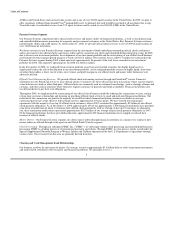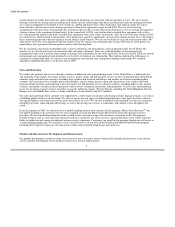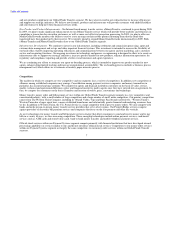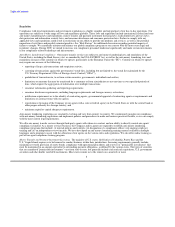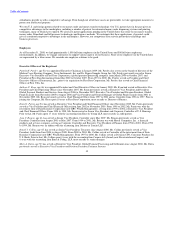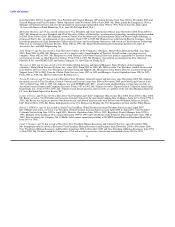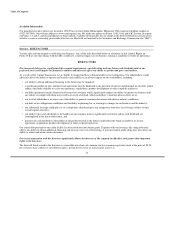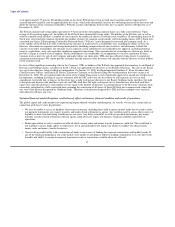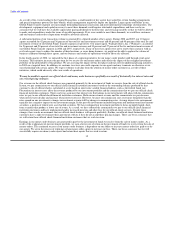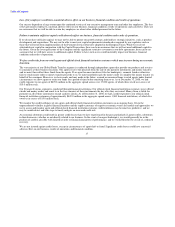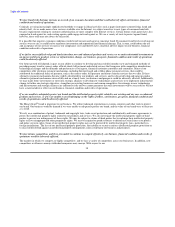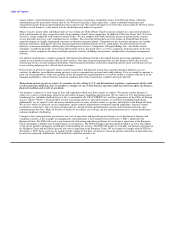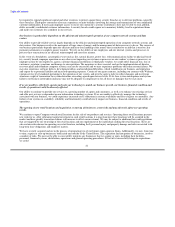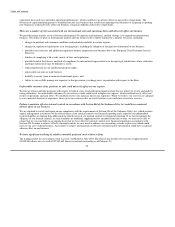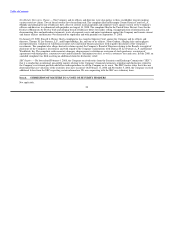MoneyGram 2008 Annual Report Download - page 18
Download and view the complete annual report
Please find page 18 of the 2008 MoneyGram annual report below. You can navigate through the pages in the report by either clicking on the pages listed below, or by using the keyword search tool below to find specific information within the annual report.
Table of Contents
As a result of the events leading to the Capital Transaction, a small number of key agents have asked for certain funding arrangements
and special remittance patterns for their benefit, which arrangements negatively impact our liquidity. Larger agents and billers in our
Global Funds Transfer segment are increasingly demanding financial concessions and more information technology customization. The
development, equipment and capital necessary to meet these demands could require substantial expenditures and there can be no
assurance that we will have the available capital after paying dividends to the Investors and servicing our debt, or that we will be allowed
to make such expenditures under the terms of our debt agreements. If we were unable to meet these demands, we could lose customers
and our business and results of operations would be adversely affected.
A substantial portion of our transaction volume is generated by a limited number of key agents. During 2008 and 2007, our 10 largest
agents accounted for 42 percent and 36 percent of our total fee and investment revenue and 49 percent and 49 percent of the total fee and
investment revenue of our Global Funds Transfer segment, respectively. Our largest agent, Walmart Stores, Inc. ("Walmart"), accounted
for 26 percent and 20 percent of our total fee and investment revenue and 30 percent and 27 percent of the fee and investment revenue of
our Global Funds Transfer segment in 2008 and 2007, respectively. If any of these key agents were not to renew their contracts with us,
or if such agents were to reduce the number of their locations, or cease doing business, we might not be able to replace the volume of
business conducted through these agents, and our business and results of operations would be adversely affected.
In the fourth quarter of 2008, we initiated the first phase of a repricing initiative for our money order product sold through retail agent
locations. This initiative increases the per-item fee we receive for our money orders and reflects the impact of the realigned investment
portfolio on the profitability of this product. We are assessing the impact of this first phase and may roll out additional pricing initiatives
in 2009 on a targeted basis. In addition, we continue to review our credit exposure to our agents and may terminate or otherwise revise
our relationship with certain agents. We expect volumes to decline from the attrition of money order customers as a result of these
initiatives, which could adversely affect our results of operations.
We may be unable to operate our official check and money order businesses profitably as a result of historically low interest rates and
our revised pricing strategies.
Our revenues in the official check business are generated primarily by the investment of funds we receive from the sale of official checks.
In turn, we pay commissions to our official check financial institution customers based on the outstanding balance produced by that
customer's sale of official checks, calculated at a rate based on short-term variable financial indices, such as the federal funds rate.
Fluctuations in interest rates affect the revenue produced by our investment portfolio and the commissions that we pay our official check
financial institution customers. There can be no assurance that interest rate fluctuations in our investments will align with the commission
rates we pay to our official check financial institution customers. Both our investment revenue and the commissions we pay decrease
when interest rates decline and increase when interest rates rise. However, because our commission rates reset more frequently than the
rates earned on our investments, changes in investment revenue will lag changes in commission rates. A rising interest rate environment
typically has a negative impact on our investment margin. In the past our investments included long-term and medium-term fixed income
securities, a portion of which were asset-backed securities. We have realigned our investment portfolio to focus on highly liquid, short-
term securities that produce a lower rate of return. As a result, we have reduced the commissions we pay to our official check financial
institution customers and have implemented and/or increased per-item and other fees for our official check services. Despite these
changes, there can be no assurance that our official check business will operate profitably. Further, our official check financial institution
customers have a right to terminate their agreements with us if they do not accept these pricing changes. There can be no assurance that
we will retain those official check financial institution customers that we wish to retain.
Earnings in our money order business are generated in part by the investment of funds we receive from the sale of money orders. As a
result of the realignment of our investment portfolio, we earn a lower rate of return on the investment of funds we receive from the sale of
money orders. The continued success of our money order business is dependent on our ability to increase money order fees paid to us by
our agents. We are in the process of repricing certain money order agents to increase our fees. There can be no assurance that we will
successfully reprice our money order agents and retain those agents that we wish to retain.
15


